Forever Orange: Jenna Cammerino ’23
A master’s degree at Newhouse felt like a second chance for Jenna Cammerino to explore her interest in writing screenplays and learning the film industry. While perusing a bachelor’s degree in physics and math at Syracuse University, Cammerino received an email about the Forever Orange Scholarship, which provides half of the tuition for students who enroll full-time in a qualifying graduate degree or certificate program at Syracuse University.
The scholarship is automatically available to all Class of 2024 graduating Syracuse University seniors who are eligible for admission—no separate scholarship application is needed. Graduating seniors who have already been admitted to a qualifying graduate program are also eligible.
Now at Newhouse, Cammerino has had the opportunity gain hands-on experience with film equipment as well as collaborate and learn alongside like-minded peers in the television, radio and film program.
Jenna Cammerino
Undergraduate Program: Physics and Math ’23
Newhouse Master’s Program: Television, Radio and Film, G’24
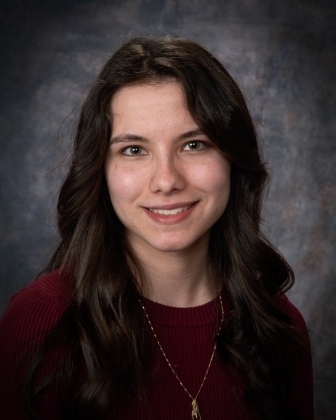
What drew you to Syracuse University for your undergraduate studies?
Well, I had first applied to Syracuse because I had already taken some courses in high school. Instead of AP, my school offered SUPA classes so I figured my credits would transfer. But what really sold me was seeing the campus and the school spirit. I got to be a part of something called Own the Dome which is basically a giant sleepover in the dome, and it was the first time I visited the university. The buildings were just gorgeous, and it was the biggest campus I had seen so far. I also remember rooting for Syracuse later that year in March Madness. I grew up in a small town, so it felt really nice to be a part of this big community and have something to root for.
What made you want to pursue a master’s degree?
After graduating, I wasn’t really sure what I wanted to do in my career. There were still so many goals of mine that I had left unexplored or put on the back burner throughout my undergrad. It had always been a goal of mine to put out a written piece, whether it be a novel or screenplay, but I hadn’t really focused on writing since high school and I knew absolutely nothing about the film or entertainment industry. So, for me, a master’s program kind of felt like a second chance at trying for that. I think a lot of people view a master’s as expanding upon what you’ve already been learning and while that’s certainly one reason to pursue one, it can also be an opportunity to try something new.
How did you first hear about the Forever Orange Scholarship and how did it play a role in your decision to attend graduate school?
I had heard about it in an email from Newhouse. I think it was a mass email, but the subject line read something like “Don’t know what you’re doing after graduation? Get a master’s degree!” I didn’t know what I wanted to do so it felt pretty fitting. But the email mentioned eligibility for the Forever Orange Scholarship, and I figured it can’t hurt to try and apply.
What unique features of your graduate program made you want to apply?
I think what attracted me the most, aside from the courses offered in the program, was how career-oriented Newhouse felt. There’s so much guidance and resources available to help you achieve your career goals and it’s not even just advising. There’s access to all kinds of software and film equipment too. And it all feels very close-knit. Even when I was applying, I had applied sort of late and had to communicate with the master’s program office a lot. They worked with me through the whole process, and it really made me feel like they wanted me here and wanted to see me succeed.
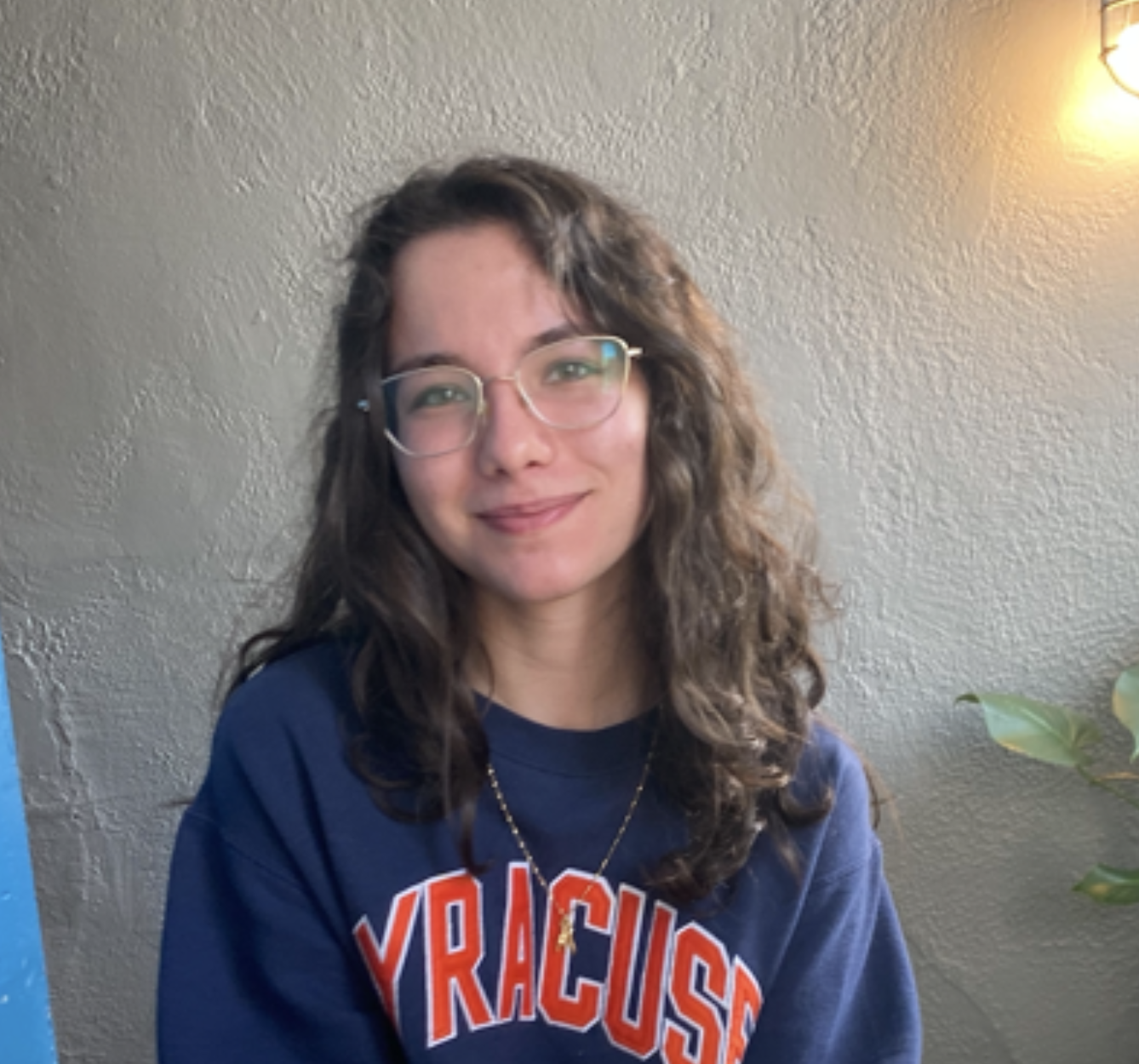
What moments in graduate school have been the most exciting or defining thus far?
I think mostly meeting new people and just getting to create. You become really close with your cohort, and you’re given a lot of liberty when it comes to projects. This semester I got to write a script for a film idea that I’ve had for years now, and it was really rewarding seeing that come into fruition. And now I’ve just begun collaborating with a friend of mine on another script, which is exciting. I’m really used to things being much more procedural. In my experiences in STEM, there were all kinds of steps you have to go through before you can even get your hands on a project. So, it’s definitely refreshing being in a space where you really can just get started and create.
What advice would you give to students that are in the initial stages of deciding to pursue graduate school?
I’d say don’t settle. I’ve seen countless students go through existential crises because they felt like they chose their career too young and now they were just stuck along that path. But there’s no reason it has to feel that way. Graduate school is a choice and while it will always be worth it, it’s definitely not something you can and should do half-heartedly. If there’s a program you’re unsure about, it’s probably not worth applying to. And if you don’t know what you want to do, there’s no harm in taking the time to figure that out. Gap years can be your friend! I actually planned for this to be my gap year and ended up finding a new career path in it.
For more information on Newhouse School graduate programs, please email nhmasters@syr.edu.
Newhouse Master’s Student Jordan Pierre Seeks to Amplify Unheard Voices Through Clothing Brand
Jordan Pierre ’23 wants to build a village—not a physical one, but a collective of people helping each other and using their voices to amplify those who may have gone unheard.
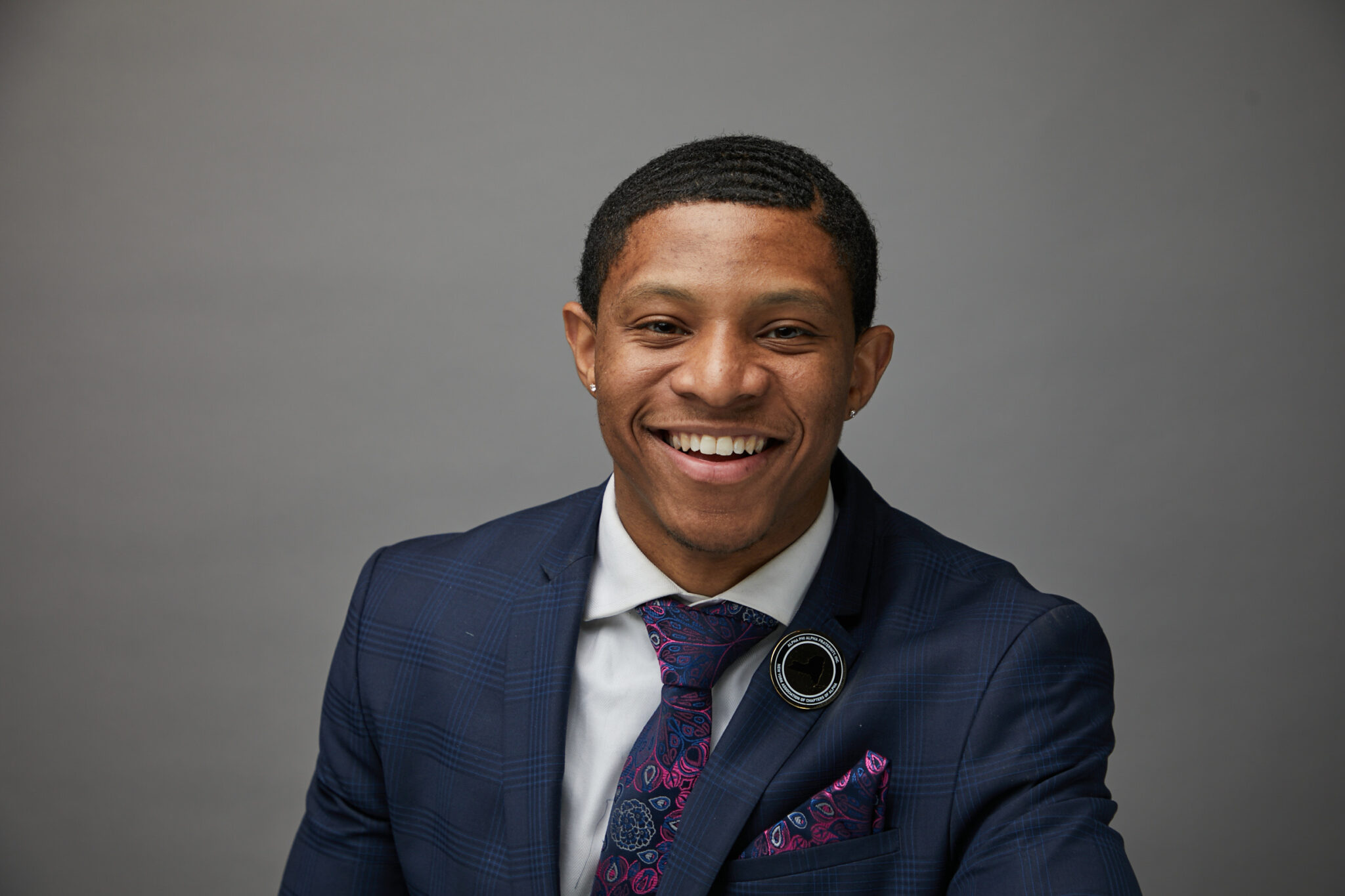
The platform for the television, radio and film master’s student to build that community is his clothing brand, VOICE, which he launched as a sophomore in high school. Pierre, who earned his bachelor’s degree in broadcast and digital journalism from Newhouse last May, maintained the business through his undergraduate career and now hopes to grow VOICE again while he completes his yearlong master’s program.
“They say it takes a village to raise a child,” Pierre said. “I extended that quote and say now that it takes a village to raise a child and that village does not have to look one way, but they must share the same mission, which is that of equity.”
The roots of VOICE go back to 10th grade, when Pierre said he witnessed the injustice of media coverage that existed back home in Brooklyn, New York. He noticed that news outlets only started to cover stories after tragedy struck, like when a young Black man in his community was killed.
“A eulogy shouldn’t be the only time the voice of my community is heard,” he said.
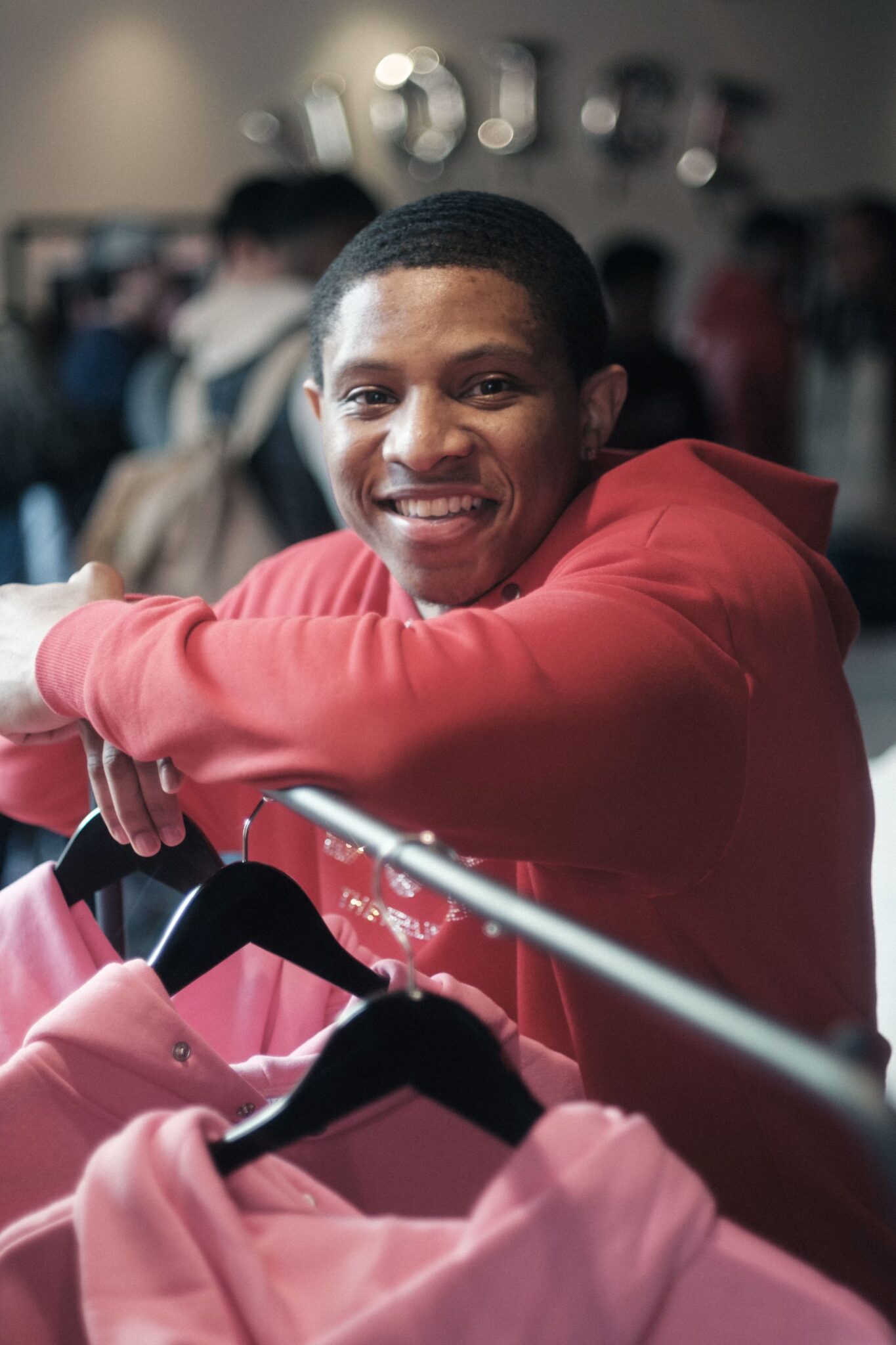
Pierre decided he would use his experiences to generate positive action and created VOICE as a “form of resistance and reaction to the conditions I was being raised under.”
Classmates and friends have asked him for years for a VOICE sweatshirt. He began granting those requests on March 27 at a pop-up shop at 171 Marshall Street in Syracuse.
The VOICE collection he promoted at the pop-up shop, called “Can’t Fold,” draws its inspiration from the streets of Brooklyn, he said.
“This phrase encapsulates the resilience of those who, despite facing adversity, refuse to succumb to despair.”
Pierre knew the decision to stay at Syracuse after earning his undergraduate degree in May was right not only for him, but for the students who will follow in his footsteps.
“I felt like there was some work that was undone, and I didn’t effectively equip or teach young men how to carry the baton after I left,” Pierre said.
Pierre is also the recipient of a Forever Orange Scholarship, which provides half the tuition for students who enroll full-time in a qualifying graduate degree or certificate program at Syracuse University. The scholarship is automatically available to graduating seniors who are eligible for admission and commit to attend graduate school immediately after graduation.
VOICE is not only a brand or a sweatshirt, but symbolic of Pierre’s village of people that want to take a stand against injustice. Pierre said that someone making the choice to represent VOICE shows that they, like him, are not going to stay silent and know they are capable of evoking change.
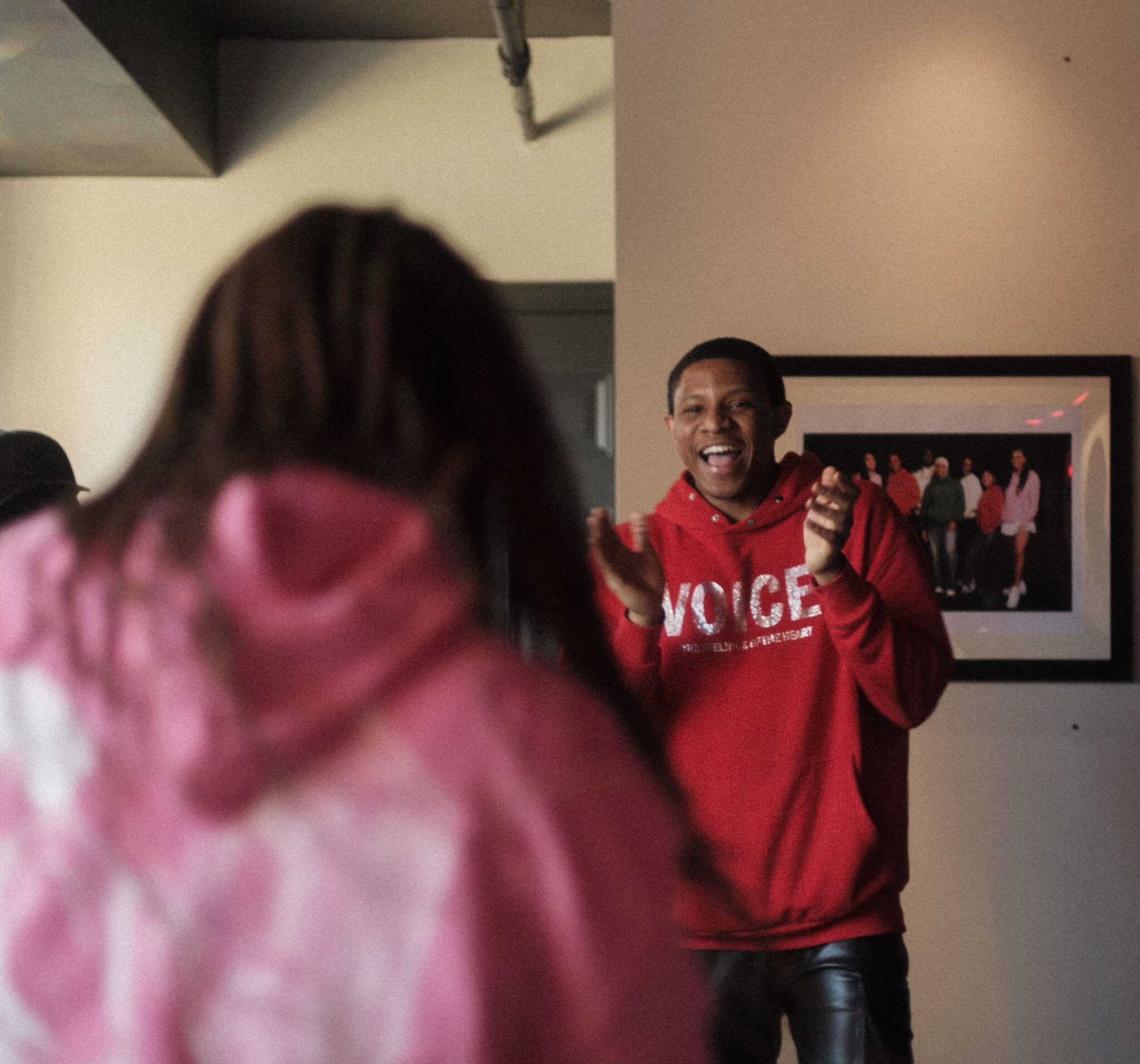
Pierre makes sure no opportunity to use his platform is wasted, making his message clear in a powerful speech at Newhouse Convocation in May 2023 that landed him on “The Today Show” on NBC.
As he completes his graduate year, Pierre is using his platform to build community. Every Thursday night, he facilitates a meeting of 15 to 20 young men on campus where he teaches them to navigate conversations about equity and making oneself heard.
These meetings, like VOICE, are about “making other people understand that they, too, have the power to shift the paradigm of the nation,” Pierre said.
For Pierre, the Newhouse School has equipped him with the understanding of language and the media to convey a message to an audience.
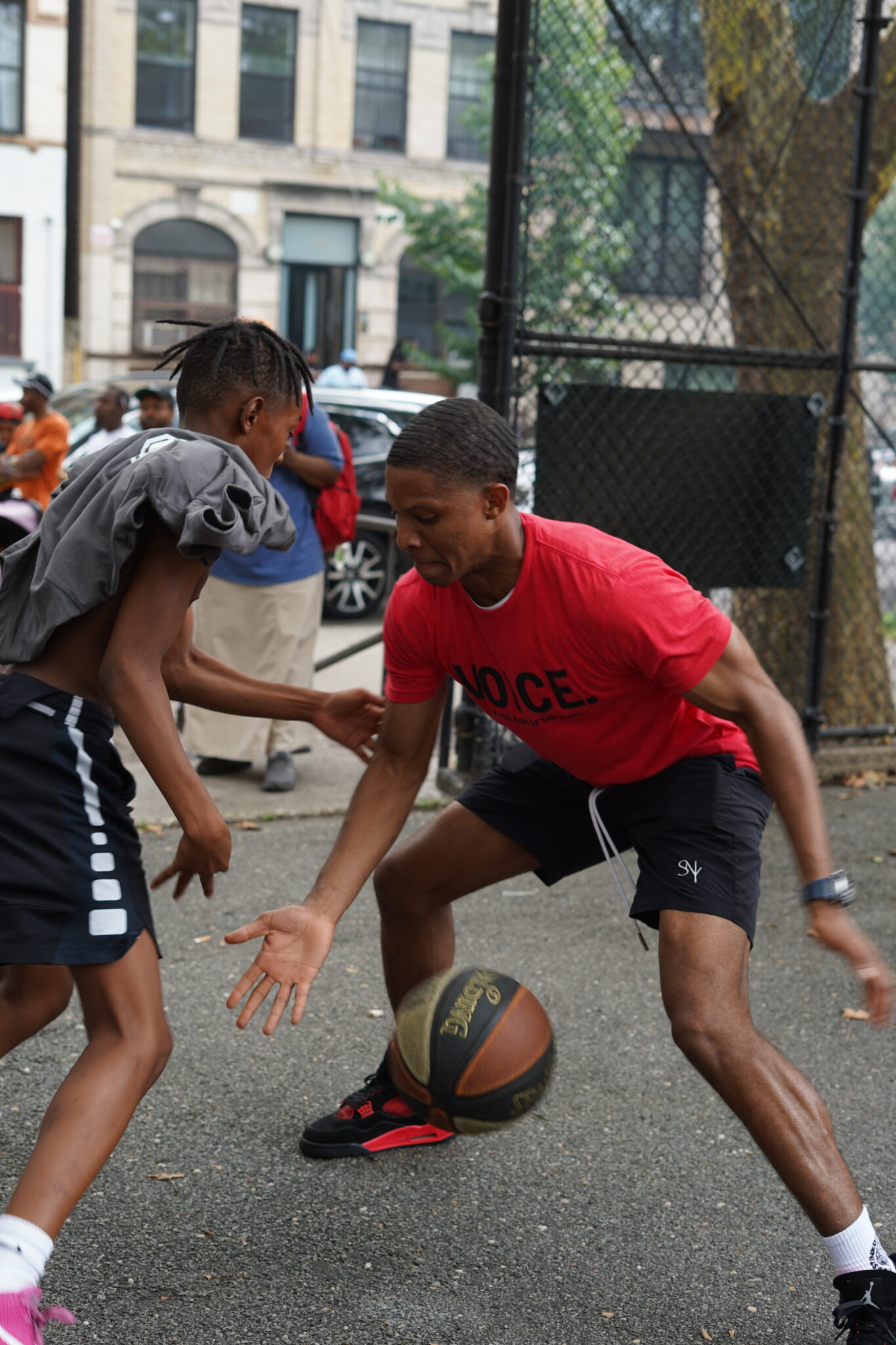
“We say that those who control media control the mind,” Pierre said, “And I’ve learned more about how media plays a role in shaping identity and shaping the lens through which we see the world.”
That’s how Pierre decided that he wants to use his platform to educate himself “and then re-disseminate certain information that is learned” to people in his community. To do that successfully, Pierre said he has tapped into lessons from Newhouse faculty members like Brad Gorham, Robert Thompson and J. Christopher Hamilton, who Pierre said have provided him with foundational knowledge, the ability to critically analyze and a financial understanding of the media industry.
With his clearly curated vision, Pierre feels that now is the perfect time for a resurgence of the brand he started in high school.
“I’m at the time now where I believe God is making space in my life to build a village,” he said. “And I think this will be the first time to see it visibly, the impact I’m having based on the amount of people willing to be a part of the village.”
Brooke Borzymowski is a junior broadcast and digital journalism major at the Newhouse School.
Newhouse Alumna Honored with Academy Award Nomination for Producing Film “Nimona”
When film producer Karen Ryan ‘06 heard the science fantasy graphic novel “Nimona” was being turned into an animated film in 2018, the Newhouse television, radio and film alumna left Disney Animation, where she had worked for 11 years, and moved across the country to produce the film with Blue Sky Studios.
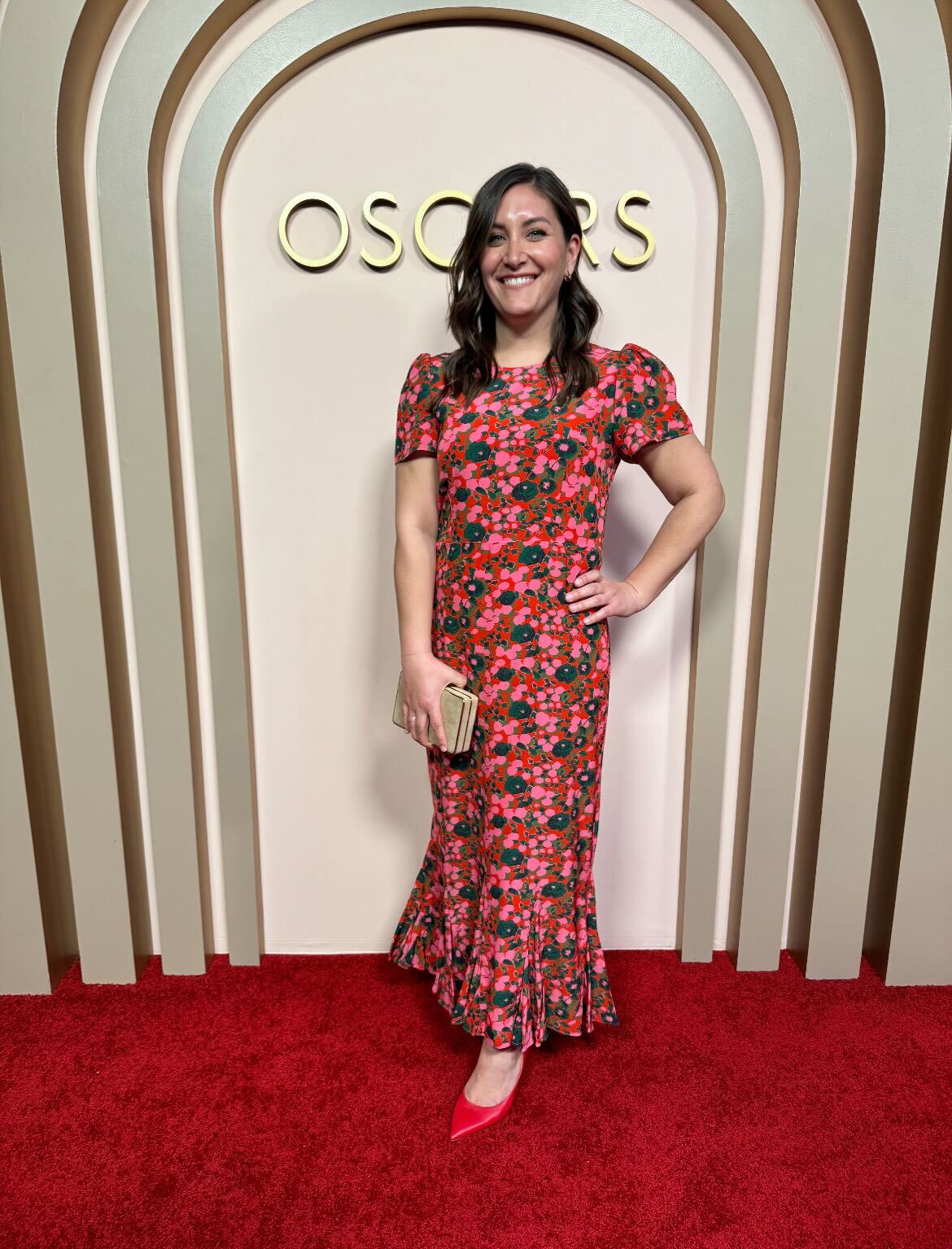
After a series of unforeseen challenges worthy of its own movie—including Blue Sky shuttering its doors in 2021 and the team thrown into a desperate mission to save “Nimona”—the film was finally released last year on Netflix. The hard work paid off: Ryan and her fellow producers earned a nomination for Best Animated Feature Film at the 2024 Academy Awards. It’s Ryan’s first nomination.
The Oscars will be awarded Sunday in Los Angeles.
How did it feel to be nominated for an Academy Award for “Nimona”?
It was pretty wild, because of what it took to get this movie made. This has been, for me personally, a six-year project. This movie has gone through multiple studios-we were shut down and canceled at one point-so the fact that we were able to bring the movie back without compromising any of the things we wanted in it and see it embraced with an Academy Award nomination felt great. It was awesome.
What were some of the challenges you faced when producing “Nimona,” especially after the closure of Blue Sky Studios in 2021?
This movie was tricky. It was the hardest project I’ve ever been a part of and the challenges were just getting the film to the screen. So there’s all the typical challenges that come with animation when you want to push the medium. And then [Blue Sky Studios] closing was just heartbreaking. We were all family over there. We had this film “Nimona,” which was such a special project at Blue Sky. And then all of a sudden, in this one phone call, it’s “Everything’s gone, but we have these reels. What are we gonna do?” We just spent every minute after that trying to find a way to save the movie. So we went around Hollywood, we played it for everybody we could, and Megan Ellison at Annapurna Pictures saw it and supported it immediately. We got her to fund it, Netflix wanted to distribute it and everything just kind of changed from there. We got to make the film that we wanted to make.
How did you get the opportunity to be a producer on the film?
I was working at Disney Animation where I was for 11 years, and I heard about “Nimona” being made at Blue Sky Studios. A good friend of mine, Patrick Osborne, was the director at the time. So I knew him, I knew of the graphic novel and when the opportunity came up they called me. They needed a producer and I just couldn’t pass it up. So, I left and went over to Blue Sky.
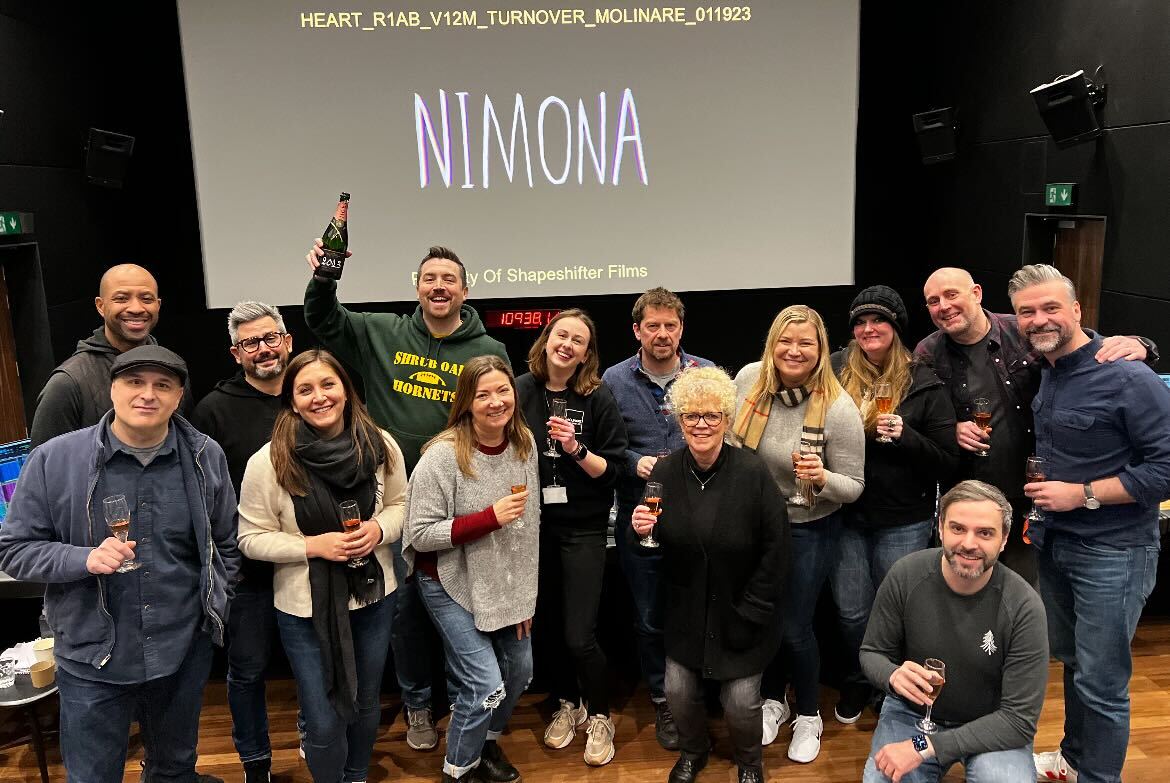
What does “Nimona” mean to you and what do you hope audiences take away from it?
I love Nimona. That character is the reason I came to the story. What I think is so special about her and the first thing that really got me is that she knows who she is and she doesn’t want to be somebody else. She just wants people to see her for who she is and to feel loved and accepted that way, and I think that is very relatable and a story we don’t really see much, especially with female characters. So, this movie was our love letter to people who feel like an outsider or like they don’t belong. To people who watch the movie, I hope they’re entertained because I think it’s hilarious and I love this film. I also hope it makes people get to know each other a little bit more and not judge people so quickly by what we assume they are. There’s space for everybody and you shouldn’t have to compromise to be able to find a community.
What opportunities did you take advantage of as a television, radio and film student at Newhouse?
I think, for me, I really wanted to work in production. I wanted to make films, and we had a lot of opportunities to do that at [Newhouse]. I took the production track, even though we didn’t have it [at the time]. I took every production class I could. At colleges like Syracuse, try all of it. Do the story you were not sure about because this is your time to experiment. When you get into the workforce, you’re mostly working on other people’s stuff for a long time. So, if you have a crazy idea and you want to make it, do it.
What advice do you have for current Newhouse students looking to be a film producer?
I think there’s so many different tracks. There’s no one way to do it, but the more you kind of let your path wander and go towards what excites you in the moment, I think that’s how you build experience that leads you to producing. So, if you want to be a producer, get to know how movies are made, understand the story process and understand the medium in which you’re working. If it’s live action, who’s your creative team? How do you work with the cinematographer? How do you get a director’s vision on screen? In producing, you’re responsible for the entire thing, so it’s not just the money, it’s not just the delivery or selling the movie. So, you really have to understand as much of it as you can and I think that makes the better producers.
Samantha Rodino is a sophomore in the television, radio and film program at the Newhouse School.
Master’s Alumni Profile: Justin Maccagnan G’22
Justin Maccagnan G’22
Newhouse Master’s Program: Television, Radio and Film
Current Position: Production Support Engineer at NBCUniversal and CNBC Business Channel
How did you obtain your current position?
This position, weirdly enough, came through a LinkedIn recruiter. My profile was suggested to her as I had a large technical background working as an engineer for trucks, stadiums and universities. I’ll be honest, I thought it was spam, so I ignored it, but after looking her up, I decided to talk to her. We had two interviews and here we are. It has been nothing short of spectacular since.
What’s an average day like for you on the job?
As a production support engineer, I support all technical equipment for CNBC business channel and NBCUniversal, specifically the New York offices at the NASDAQ. This includes camera equipment, graphics operation systems, INews software, transmission technology and control room operations (any equipment breaks, I am fixing it). Aside from this, our shop has also merged with the IT department. So, I am also tasked with making new employee work accounts, troubleshooting computer programming issues, internet software updates, fixing PC routers and dealing with any issues that may be IT related.
Any given day can be vastly different, which is why I love this job so much. We are a call support shop, so we respond to whoever calls with an issue, meaning one day I could be working on an INews issue and the next I am working on a camera problem in one of the main studios. On a regular day, I am also working on major projects that the network needs done. These projects come in spurts, but they are very exciting, and I love knowing that I am working on the future studios/equipment of CNBC.
How do you feel Newhouse prepared you for your current position?
Classes in sports and TV production were what helped prepare me the most for my current position. With professors like Olivia Stomski and Andy Robinson, I was able to obtain base knowledge of how to work in sports production and operate cameras as well as learn technical aspects of production. Specifically with Robinson’s class, the greatest part was staying after our show tapings and studying the technical aspects that went into operating the graphics system as well as the TD switchboard. I never thought staring at wires would be so enjoyable but after seeing how every wire contributed to the broadcast, I was hooked. Without Robinson’s class, I don’t know if I would have gone in the direction I did.
All of the hard skills I learned were from being an engineer intern for the ACC Network and Syracuse Athletics. I did this job for the entire time I was in Syracuse. Things I learned included how to make ethernet cables, hardwiring cameras, setting up audio consoles, troubleshooting video signal issues and cleaning fiber cables. I developed a very close friendship with the chief engineer of Syracuse Athletics, and that friendship both led to my current job and is a friendship I will have for the rest of my life. In truth, Newhouse as well as Syracuse Athletics helped guide me to what my true-life passion was.
Did Newhouse open your eyes to new professions or aspects of your field you may have not considered when applying?
Through Newhouse, I was introduced to the ACC Network and Syracuse Athletics. At first, my objective was to just get in the door and work live sporting events. Scott Hecht, the then director of ACC Network, appreciated my enthusiasm and asked if I wanted to be an engineer intern. I had no clue what engineers do, but to me, it was an opportunity, so I jumped at it. That one leap of faith was what led me to where I am now.
The greatest thing that happened to me while at Syracuse was working for Tom White, the chief engineer for Syracuse athletics. Up until I met Tom, I had never known what an engineer does. Tom took every chance he had to teach me something new. As an engineer, your main task is knowing every single piece of equipment, wire and cable that goes into a specific broadcast. You are the line of defense if something falls apart and all eyes look to you to fix said problem, so you are always learning something new. With Tom, we dealt with lots of issues, and I began to realize this is the career path I wanted to pursue. Very few people want to become broadcast engineers, so this helps the field as there are usually job openings for these positions. I saw this as not only an exciting growth opportunity, but one that I could make a full career out of.
What unique features of your graduate program drew you to it?
One of the key features of my program was that I was brought on as an instructional associate. As someone who aspires to be a college professor one day, I saw this as a wonderful opportunity to get some teaching practice. I worked with first year and sophomore production courses and loved every minute of it.
The television, radio and film program is arguably the most unique program at Syracuse. It is an amazing program in that the objective of both the professors and the curriculum is to allow the student to grow their mind as well as tap into their creative potential. The program’s objective is to help you find your creative voice and run with it. Aside from that, this program also uniquely combines all facets of the film and entertainment industry into the coursework, including screenwriting, pitching films, business models of the film industry, production and law practices that all networks/film houses follow, giving a well-rounded knowledge of the entertainment world.
Lastly, if you join the program and you feel you may not be bonding with the film material as much, Michael Schoonmaker, the television, radio and film department chair, is more than willing to help find you electives that are in the other programs of Newhouse. I had several graduate friends take courses outside the normal TRF curriculum and they couldn’t have been happier.
Did the Newhouse Career Development Center aid you?
The Newhouse Career Development Center did help me, both with my resume as well as job leads. Bridget Lichtinger was crucial to my success at Syracuse and my resume looked a lot better once we went over it a couple of times. She is a true asset to the school.
What are some obstacles or misconceptions about your field?
A lot of young students that get into the broadcast engineering field may think they just set up the equipment and then leave it for the people to operate. Unfortunately, this is anything but true. As an engineer, your job is to know where everything goes for a broadcast. And when I mean everything, I mean EVERYTHING.
I’ll use an example: Say you are using a Sony camera. As an operator you just need to know which buttons on the camera do what, how to shoot and what to shoot. As an engineer, you need to know button functions, where do the wires that are connected to the camera go, what signal goes to those said wires, what is the lens type of the camera, what unit powers the camera and what signal sends to the operator so they can see what they are shooting. When you think about this, most people’s minds explode and you’re not expected to know all this right out of the gate- but when you work many years in the field, you are expected to eventually know all the information pertaining to those systems spoken about.
What moments in your career have been most exciting or defining thus far?
There have been many, so I’ll name a couple:
The engineer job with CNBC and NBCUniversal: This is a position most people don’t get until they are in their 30s due to the level of knowledge required. By a stroke of luck, I was brought on with an expectation they would train me on equipment for the long term, so I am always appreciative that I got such a unique and amazing opportunity.
Phillies corporate event: This was the first major corporate event I had worked for the Phillies and due to a callout, I was left to man the event by myself. I set up everything, operated all consoles and broke down everything afterward. It was a big moment for me as it increased my confidence that I could do these events by myself.
What advice do you have for current or incoming students?
One of the greatest assets of Newhouse is the main control room for Syracuse Athletics and ACC Network out of Syracuse. Go inside, look around and talk to the people that run operations there- they are always looking for dedicated students that can work events and want to learn. Whether you are someone that wants to be an on-air talent, producer, replay operator, or even engineer, they always have spots available for people to get involved.
Even if you don’t enjoy it as much as I did, I promise you the most successful producers and on-air talents are the ones that know about the technical aspects of a TV broadcast. It can only help you in the long run.
The classes I recommend are any production classes with Olivia Stomski and I also recommend any courses with Kelly Leahy, Robert Thompson and Shaina Holmes. Three of the best professors I had while at Syracuse.
Master’s Alumni Profile: Aahliyah Halloway G’22
Aahliyah Halloway G’22
Newhouse Master’s Program: Television, Radio and Film
Current Position: Content Producer at WSET-ABC13
How did you obtain your current position, and what positions did you hold before it?
This was my first job after getting my master’s degree and before that, I was a development intern at American High and Alta Global Media.
What’s an average day like for you on the job?
I get to work at 2:30 in the afternoon and check my emails to see what stories the reporters were assigned to for the day, check for breaking news and any big national stories I need to follow. Then I get ready for our afternoon meeting. This is where we discuss the reporter’s stories in more detail and come up with backups for them in case their story does not pan out or we need to put it on hold for the day. We also lay out the plan for our late newscast during the meeting. I produce two shows, the 6 p.m. and 11 p.m. newscasts. My job is to make sure the shows are as clean as possible. To make sure we start and end on time and put out any fires that may happen. After I finish the 6 p.m. newscast, I prepare my rundown for the 11 p.m. and take a dinner break. Then it’s kind of the same as when I first get to work, we have another meeting and discuss if there are any changes we need to make. Then I get ready to produce the 11 p.m. newscast.
How do you feel Newhouse prepared you for your current position?
The beauty of Newhouse is that they offer you ways to really see what the industry is like, so when you enter it’s less of a shell shock. Through Newhouse, I learned time management (which is very important) and creating a schedule (it really helps you to stay on track) and I think the courses at Newhouse are a great pre-introduction if you will to the industry.
Did Newhouse open your eyes to new professions or aspects of your field you may have not considered when applying?
When I first entered Newhouse, I had a limited view of creative language and thought screenwriting was the sole avenue for its expression. However, my experience in various courses and group projects introduced me to diverse writing forms that demand just as much creativity, such as magazine articles and news stories. Newhouse has truly expanded my horizons, showing that having a specific skill in mind upon entry can open the door to a world of unexpected possibilities.
What unique features of your graduate program drew you to it?
The sense of collaboration is what cemented my choice to join the television, radio and film program. It was wonderful not only to see my own ideas come to life but others as well.
Did the Newhouse Career Development Center aid you?
The Career Development Center was a tremendous help with perfecting my resume. If you haven’t gone by the center yet I would definitely recommend it.
What are some obstacles or misconceptions about your field?
In television, things rarely go perfectly. You have to have the ability to pivot and stay somewhat calm. And when things go wrong, and they will, don’t get too hung-up on your mistakes. Luckily, this is one of the few careers where you can start each day with a clean slate.
What moments in your career have been most exciting or defining thus far?
I think the whole process of putting something together and then watching it come to life has been so great. I look at my job as a way of storytelling and I’m always eager to tell the next one.
What advice do you have for current or incoming students?
Be open and willing to learn and embrace group projects. You never know what new skill you might pick up or what new journey it might put you on. If you have the opportunity, take any of Dr. Kelly Leahy’s courses. She is brilliant and will push you to think in ways you haven’t before.
Master’s Alumni Profile: Nia Lucky G’22
Nia Lucky G’22
Newhouse Master’s Program: Television, Radio and Film
Current Position: Freelance Associate Producer at CBS News, Broadcast Marketing division
How did you obtain your current position, and what positions did you hold before it?
In the spring semester, CBS News took a trip to Newhouse and held an information session. They allowed students to meet with an impressive roster of CBS representatives. Ironically, I never attended due to a prior engagement. Someone in my cohort, whom I now call a dear friend, spoke highly of me, and passed along my resume. Shortly after that moment, I went through the interview process. About a week after I put on my cap and gown and walked across the Dome turf, I received an offer and was officially employed! I like to think of CBS as my first big girl job. Before joining the company, I was heavily involved with Orange Television Network at Syracuse. I also held various internships, the most recent being a production intern at Seacrest Studios under the Ryan Seacrest Foundation.
What’s an average day like for you on the job?
If you know the news industry, it is challenging to describe an “average day.” My role is to cater to the thirteen owned and operated stations and over two hundred affiliates at CBS Networks.
The cool thing about my position is that I can work across all CBS News broadcasts and platforms — I primarily focus on “CBS Mornings” with Gayle King, Tony Dokoupil, Nate Burleson and “CBS Evening News” with Norah O’Donnell. I service network producers, executives and on-air talent to help improve the brand of CBS News programs and provide high-quality promotional content for the affiliates.
How do you feel Newhouse prepared you for your current position?
One of my favorite courses at Newhouse was Mornings on the Hill with Professor Keith Kobland. The class emulates what I do in my day-to-day tasks at CBS. It is a broadcast and digital journalism course that is run like a newsroom and produces a 30-minute morning show. I was one of two students with a focus on television, radio and film. Professor Kobland ensured I was not an outlier and always worked with me. It was also exciting because each week, we would step into a new role, whether co-producing, anchoring or reporting on weather.
Mornings on the Hill taught me to work on a deadline, understand AP ENPS and write anchor toss lines and teases. All of which I do now!
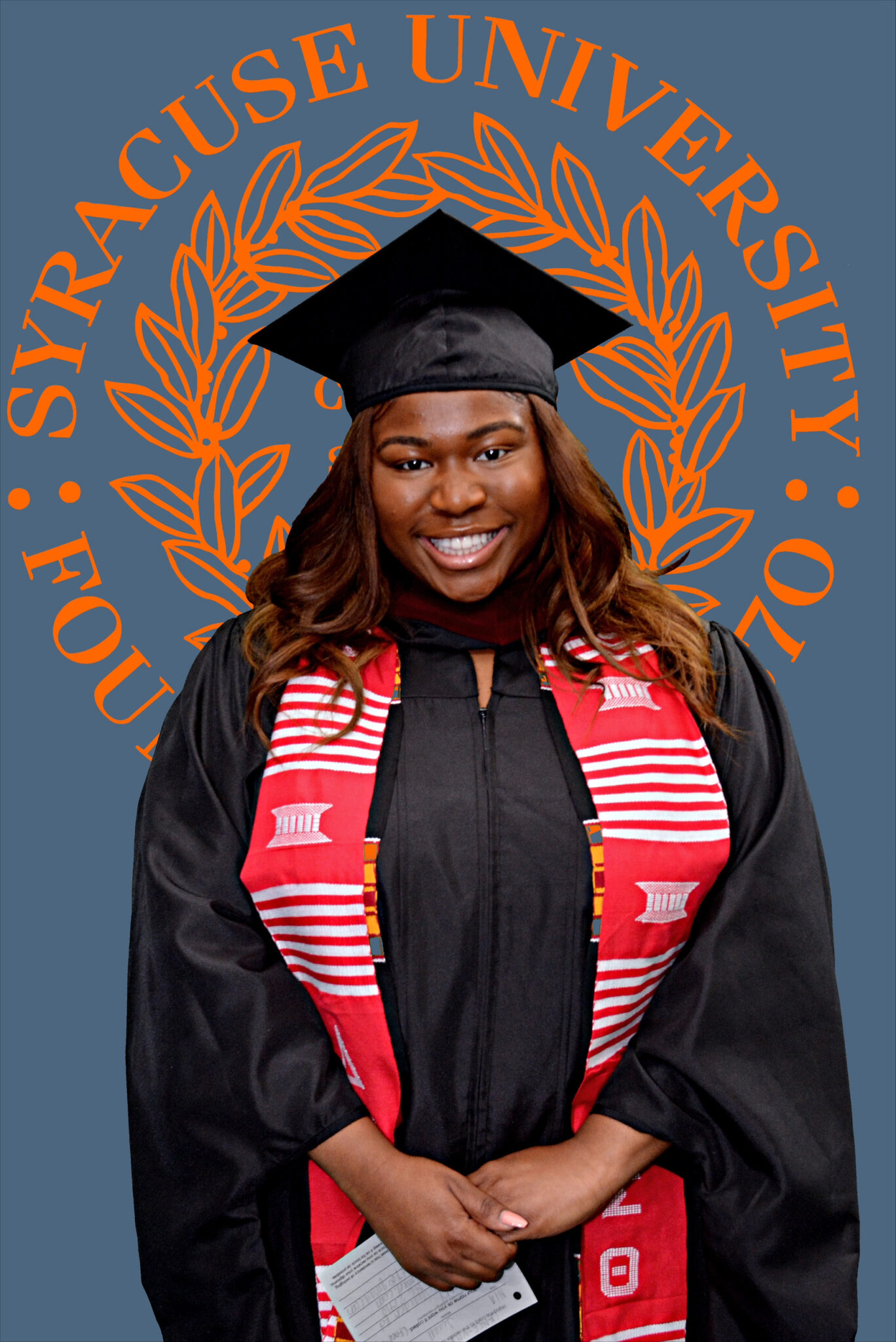
Did Newhouse open your eyes to new professions or aspects of your field you may have not considered when applying?
Do not put yourself in a box! Those random interests or passions can take you far. I had that a-ha moment during Professor Kelly Leahy’s course. It was the beginning of the summer session, also known as boot camp, and Leahy shared her well-versed career. I was amazed that she took what made her happy and made it into a profession. She leaned into her joy of children’s programming, technology and research. It might seem silly, but many people diminish one of their talents to make the other shine. You do not have to do that! Both can flourish simultaneously.
What unique features of your graduate program drew you to it?
I will always love hard news, but entertainment news has my heart! I am an entertainment enthusiast and understand the power of being versatile. When I looked for a graduate program, I wanted to know if I could diversify my television, radio and film talents. I wanted to strengthen my on-camera presence, writing and editing and use film to advertise pop culture. I needed to know if I could incorporate all the elements I am passionate about in graduate school. Newhouse did not frown upon being divergent. The program understands the industry.
Did the Newhouse Career Development Center aid you? What internships or volunteer opportunities did you do while at Newhouse?
Always stay resume ready! I was active in Orange Television Network (OTN), WAER, and as an instructional assistant. I visited the Career Development Center to help incorporate my new roles into my resume, and I am so thankful I did! You never know who will pop by Newhouse and when your next opportunity will come. I was able to learn that first-hand!
I wanted to strengthen my on-camera presence, writing, editing and use film to advertise pop culture. I needed to know if I could incorporate all the elements, I am passionate about in graduate school. Newhouse did not frown upon being divergent. The program understands the industry.
What are some obstacles or misconceptions about your field?
There is no clear-cut way to get to your end goal. I often asked Michael Schoonmaker, the television, radio and film department chair, and other professors for a how-to guide. I wanted to know what to do and how to get there. The lack of direction frightened me and still does at times. But — there is beauty to this concept. Career possibilities are endless, and no matter what lane you pick, exit you take, or U-turn you make, if you keep working toward your goal, you will get there!
What moments in your career have been most exciting or defining thus far?
A pinch-me moment was during my first Zoom meeting for the morning show’s rundown. I will never forget the gratitude I felt seeing news legends like Gayle King, Nate Burleson and Syracuse alum Scott MacFarlane, plus all the magic it takes to create programming. And yes, I texted my family group chat to share my awe!
What advice do you have for current or incoming students?
1. Graduate school is when it gets real.
You are not taking courses to get a picture-perfect transcript. Take classes outside your element, become well-versed and use your professors as resources outside the classroom. These things will make you stand out when you go in for that job interview.
2. Closed mouths do not get fed.
Advocate for your career goals and communicate with your professors what you want from the course. Newhouse’s faculty and staff are exceptional and will tailor your curriculum, but they must know what your interests and passions are first.
3. Have fun!
Graduate School could be the last chapter of your collegiate career unless you plan to continue your education. Make friends in your cohort, and plan group outings. You will surprise yourself with how many relationships you make during your short time.
4. Tap into the alum network!
The Newhouse Mafia is real, and alums want to see you succeed. LinkedIn is a great tool to connect with current and previous Syracuse students. Send them a message and ask to pick their brain. You never know what you will learn or where the conversation will take you.
Joe Castiglione G’70 Honored as 2024 Ford C. Frick Recipient for Excellence in Baseball Broadcasting
The moment Boston Red Sox fans had dreamed of for 86 years was nearly at hand that fall evening back in 2004. The last time the Red Sox were crowned kings of the baseball world, back in 1918, radio hadn’t yet been invented as a medium, so when Joe Castiglione G’70 uttered his now-famous call, he became the first broadcaster to declare the Red Sox World Series champions on that fateful night, Oct. 27, 2004.
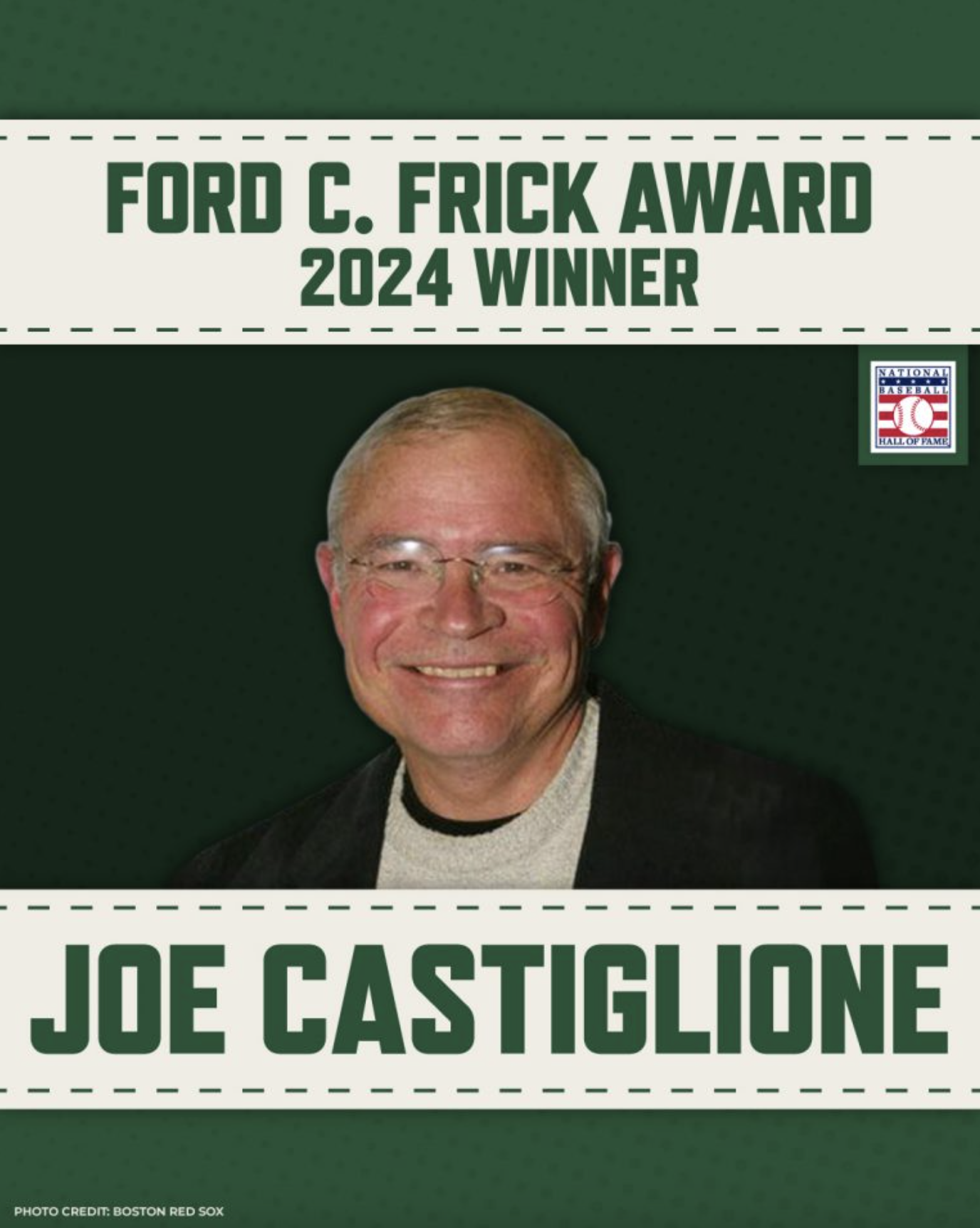
“Swing and a ground ball, stabbed by [Keith] Foulke. He has it, he underhands to first — and the Boston Red Sox are the world champions. For the first time in 86 years, the Red Sox have won baseball’s world championship. Can you believe it?” Castiglione told the audience as Red Sox players mobbed each other in celebration after snapping what was the second-longest World Series drought in baseball history.
The ball from the final out of that World Series is on display at the Baseball Hall of Fame in Cooperstown, New York, and on Wednesday, Castiglione received word that, he, too, was heading to Cooperstown as the 2024 recipient of the Ford C. Frick Award, presented annually for excellence in broadcasting by the National Baseball Hall of Fame and Museum. He joins fellow honoree Bob Costas ’74 (2018) as the only Orange alumni to win this award.
Castiglione has been delivering his signature call, “Can you believe it?” as the radio voice of the Red Sox for 41 years, but when the Hall of Fame called and delivered this news, Castiglione said he was the one who couldn’t believe what he was hearing.
“You never dream of these things when you’re starting. My first goal was to do Major League Baseball. My second was to do a World Series, then to win a World Series, but this was nothing that was on my radar ever, and it’s just such a thrill to be honored by my peers,” Castiglione said in a conference call with reporters. “To have my name in that broadcasters section … It’s just amazing.”
Castiglione earned a master’s degree in television and radio from the S.I. Newhouse School of Public Communications.
And … Action! Newhouse Students Get a Taste of What It’s Like Developing a Hollywood Movie Script
Newhouse School students are getting a taste of what it’s like to take a script for a Hollywood movie from the development stage to the big screen.
A new immersive learning opportunity lets television, radio and film (TRF) program students pitch ideas about actors, directors and producers to senior executives in the Lionsgate Motion Picture Group. The executives are also getting feedback on their scripts through virtual conversations with the students. This learning experience is all part of a capstone course this fall for TRF students interested in careers as executives in media, entertainment or the arts.
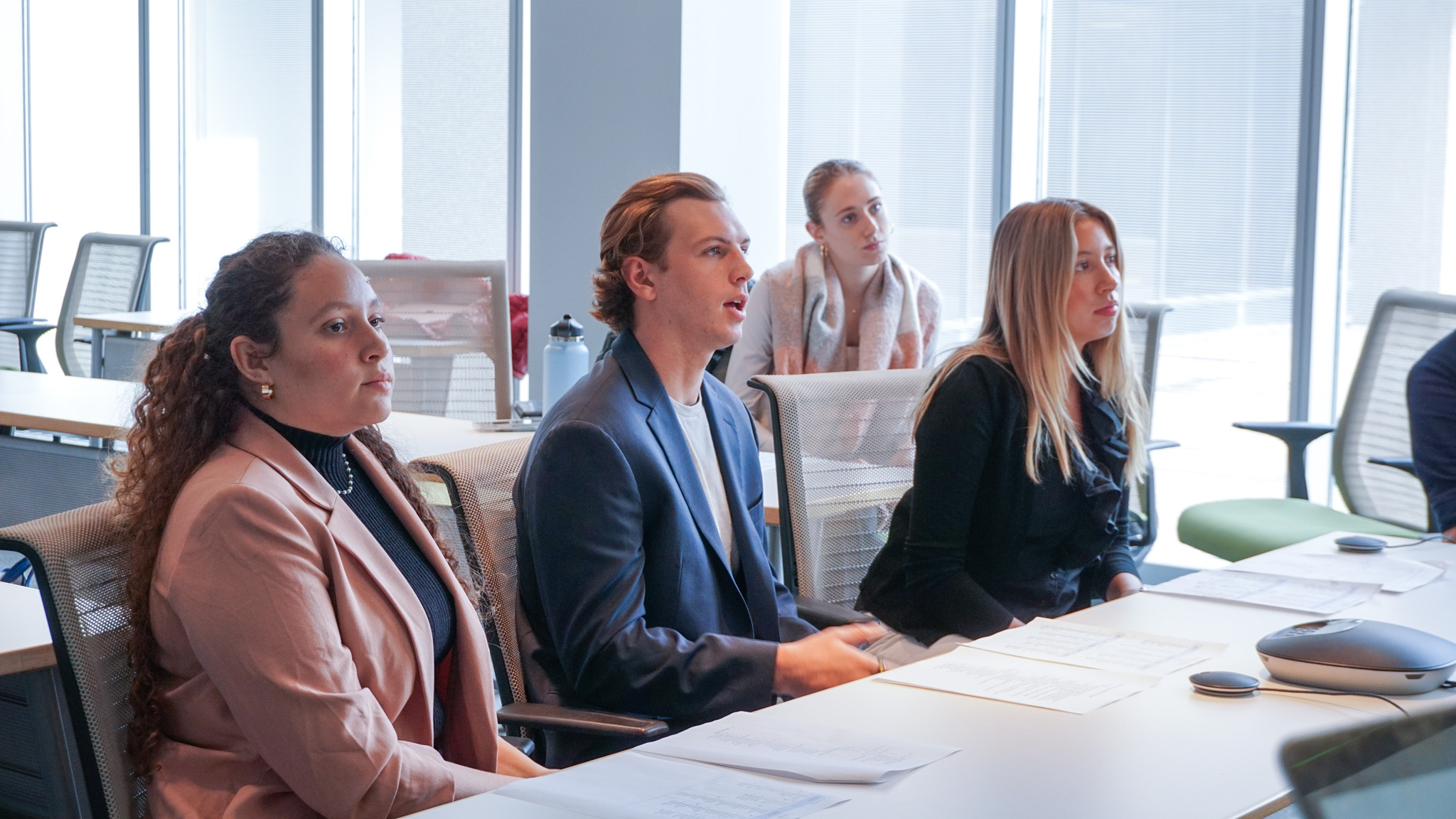
The collaboration is spearheaded by Erin Westerman ’04, president of production of the Lionsgate Motion Picture Group, and J. Christopher Hamilton, a TRF assistant professor. Conversations about the idea started when Westerman returned to her alma mater in May to deliver the keynote address at the Newhouse Convocation Ceremony for the 2023 graduating class.
“We wanted to offer Syracuse students real feedback to projects they are developing and workshopping,” Westerman said. “Access can lead to opportunity and this class offered real insight from executives who are working in the business.”
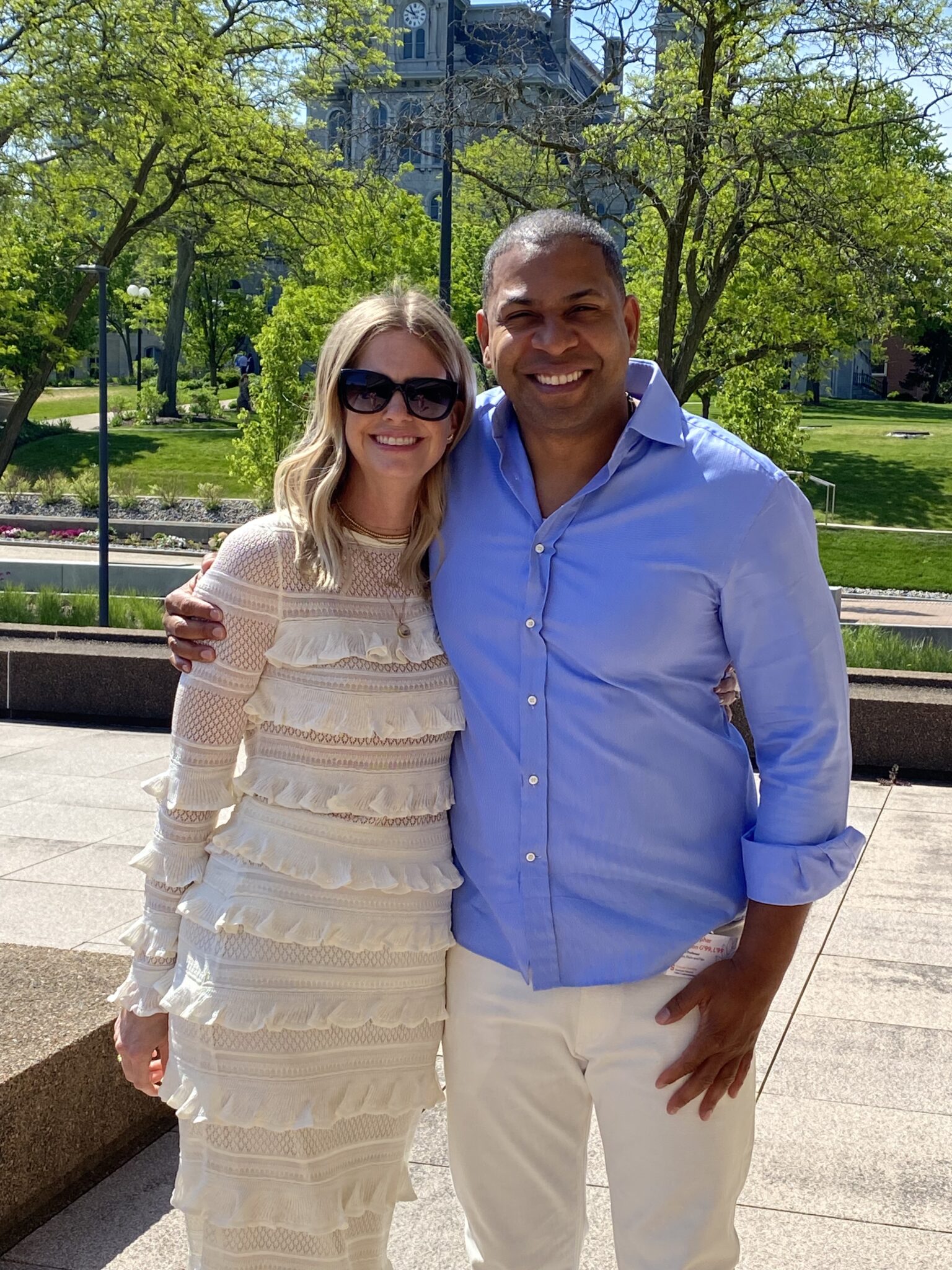
It’s the latest example of experiential learning opportunities that Newhouse has developed for Syracuse University students in the TRF executive track. Other experiences this semester included a class trip to the Toronto Film Festival to screen movies, learn from industry veterans and network with filmmakers, as well as Newhouse visits from Robert Halmi ’79, founder and chairman of Great Point Studios, and Joseph Cohen, president of American Entertainment Investors and author of “Investing in Movies: Strategies for Investors and Producers.”
Lionsgate Motion Picture executives Brady Fujikawa and Chelsea Kujawa, as well as department coordinator Alex Tannebaum, have also been instrumental in implementing the studio’s collaboration for the TRF executive track course.
“All of these experiences culminate with students interacting with Lionsgate executives to pitch scripts they have in active development,” Hamilton said.
“Students must identify the actors, directors and producers that they think would be the most compelling talent choices to transform their project or literary property into a greenlighted success story and present a compelling business and creative analysis for their project,” he added.
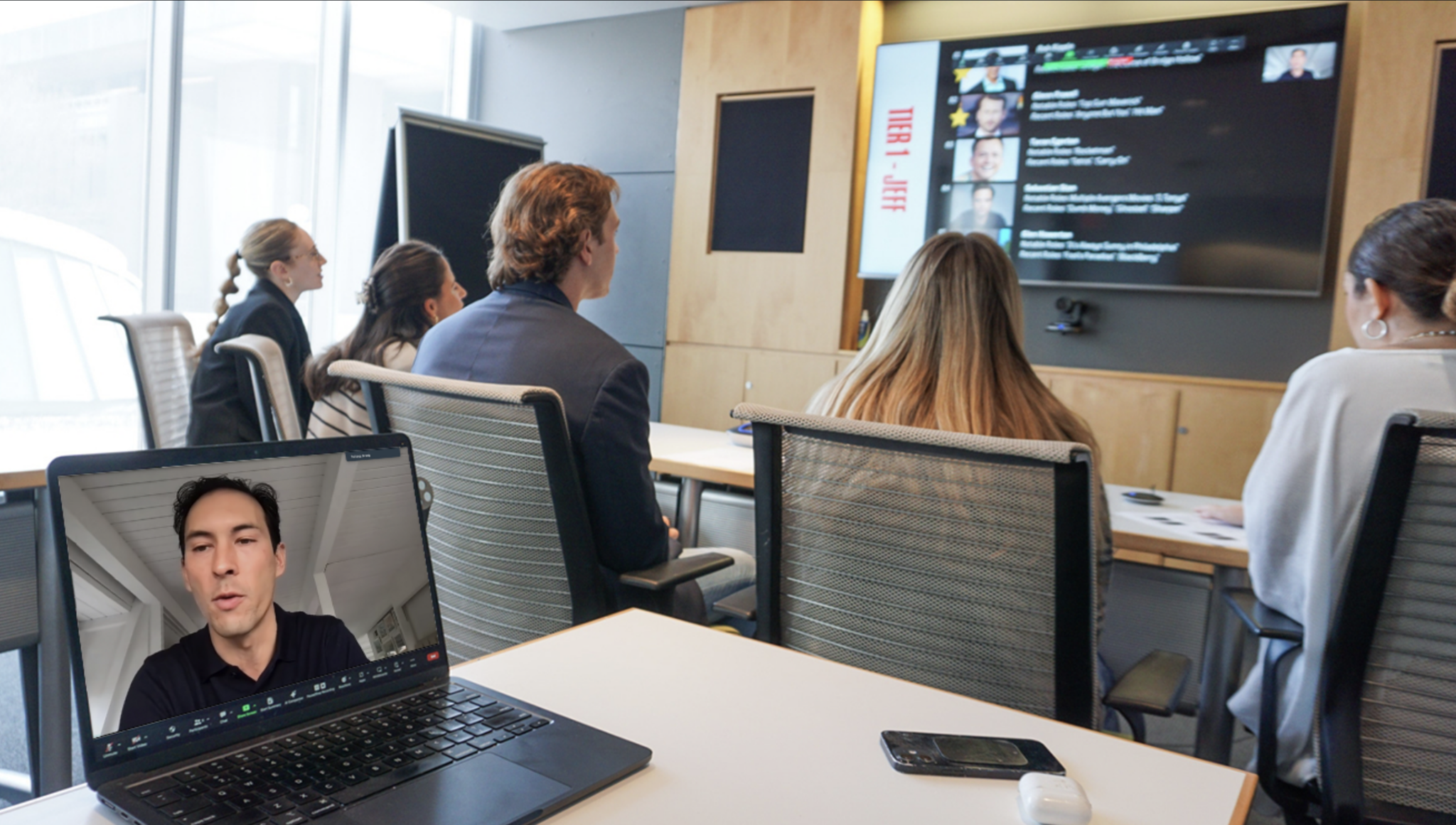
While pitching to studio executives might sound intimidating, senior Samantha Meir said the process was conversational, though preparation was key. The TRF major hopes to draw from the experience as she builds toward a career of working at a talent agency to represent television writers.
“The partnership has been really helpful for us to get a more present view (of the entertainment field) from current executives,” Meir said. “They’ve been able to give us a lot of valuable insight on where the industry is going.”
Mia Rodriguez, a TRF senior minoring in theater, said she appreciated the feedback that students received about realistically making cast pitches according to budget. The Lionsgate interaction, coupled with the trip to Toronto, also helped students focus on the business side of the industry and practice their networking skills, which will be important to hone as they enter the entertainment field.
“It was really nice to be able to take this kind of class, especially as someone who wants to enter the business side of the industry,” she said. Rodriguez, who wants to go into the music industry, is thinking about specializing in copyright law.
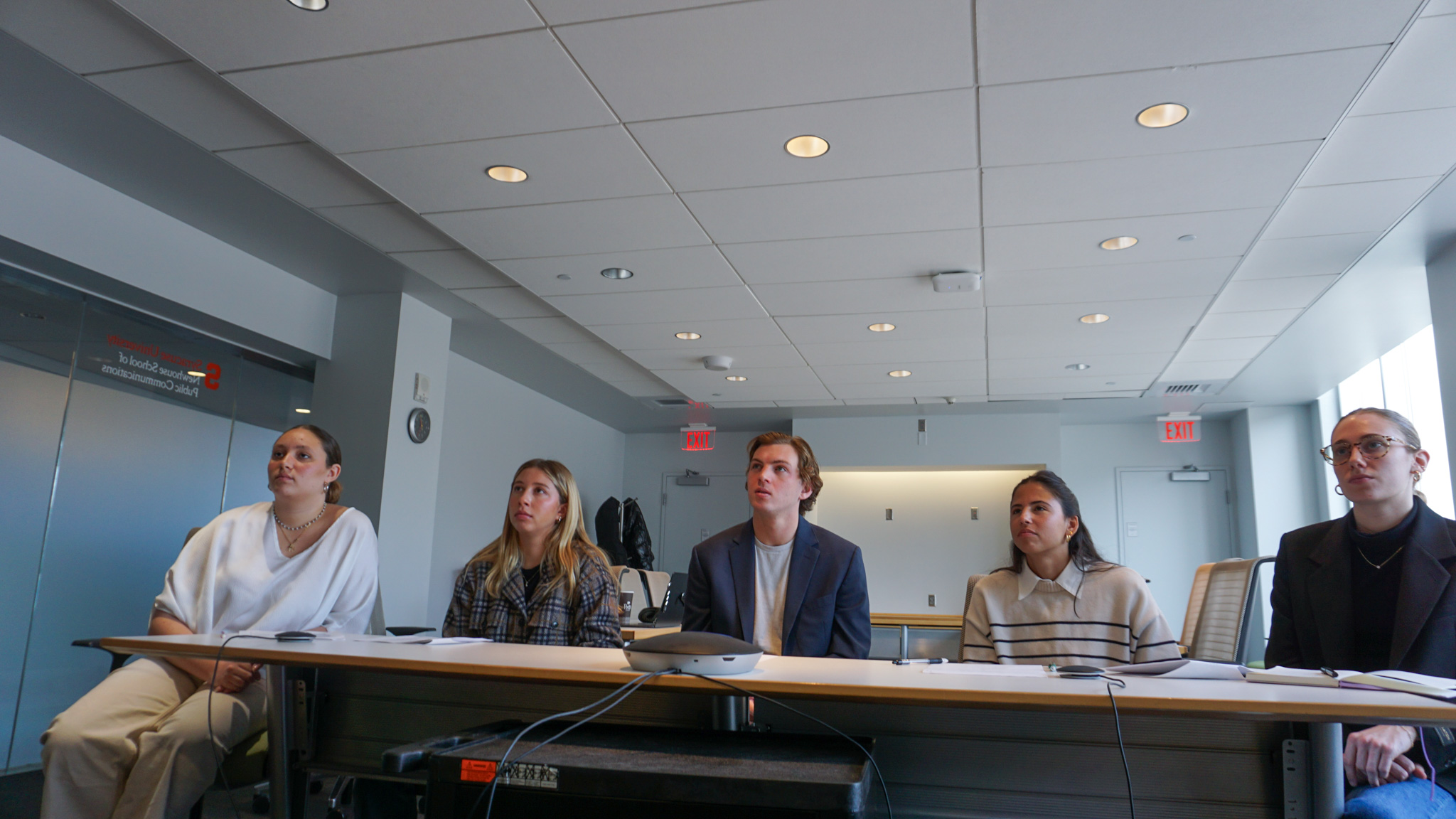
The foray into motion picture development with a major Hollywood studio comes on the heels of Newhouse offering students another immersive opportunity in the field of talent representation. United Talent Agency (UTA) and Newhouse launched a robust partnership for Hamilton’s artist representation training course in 2022, which includes in-person instruction from the company’s agents.
Students spent a day at UTA’s New York City headquarters in the Fall 2023 semester, learning from seasoned agents and executives representing clients in music, television and broadcast news. The students also spent part of the day pitching the agency on talent they’ve tracked and who they believe the company should represent, in addition to networking with Newhouse alums working at UTA.
In 2022, Newhouse also launched a partnership with Halmi’s Great Point Studios to offer internships for TRF students enrolled in the Newhouse NYC program. Lionsgate has also partnered with Great Point Studios on three production facilities in cities including Yonkers, Atlanta and Newark.
In Memoriam: Phil Quartararo ‘77
A listener who tuned into a pop radio station at any point over the last 30 years more than likely would have heard a catchy song from stars influenced by Phil Quartararo ‘77.
The veteran music executive introduced U2 to the United States in the 1980s and developed the careers of artists like Paula Abdul, Linkin Park and the Spice Girls. And that was only a small number of the big-name performers who worked with someone who became known fondly in the industry as “Phil Q.”
Just as important to Quartararo was his dedication to Syracuse University and the Newhouse School, and a commitment to helping develop future leaders of the music industry. Quartararo was one of a handful of executives who worked with Martin Bandier ‘62 and the University to create the Bandier Program for Recording and Entertainment Industries.
Quartararo died Nov. 22 in Los Angeles of pancreatic cancer. He was 67.
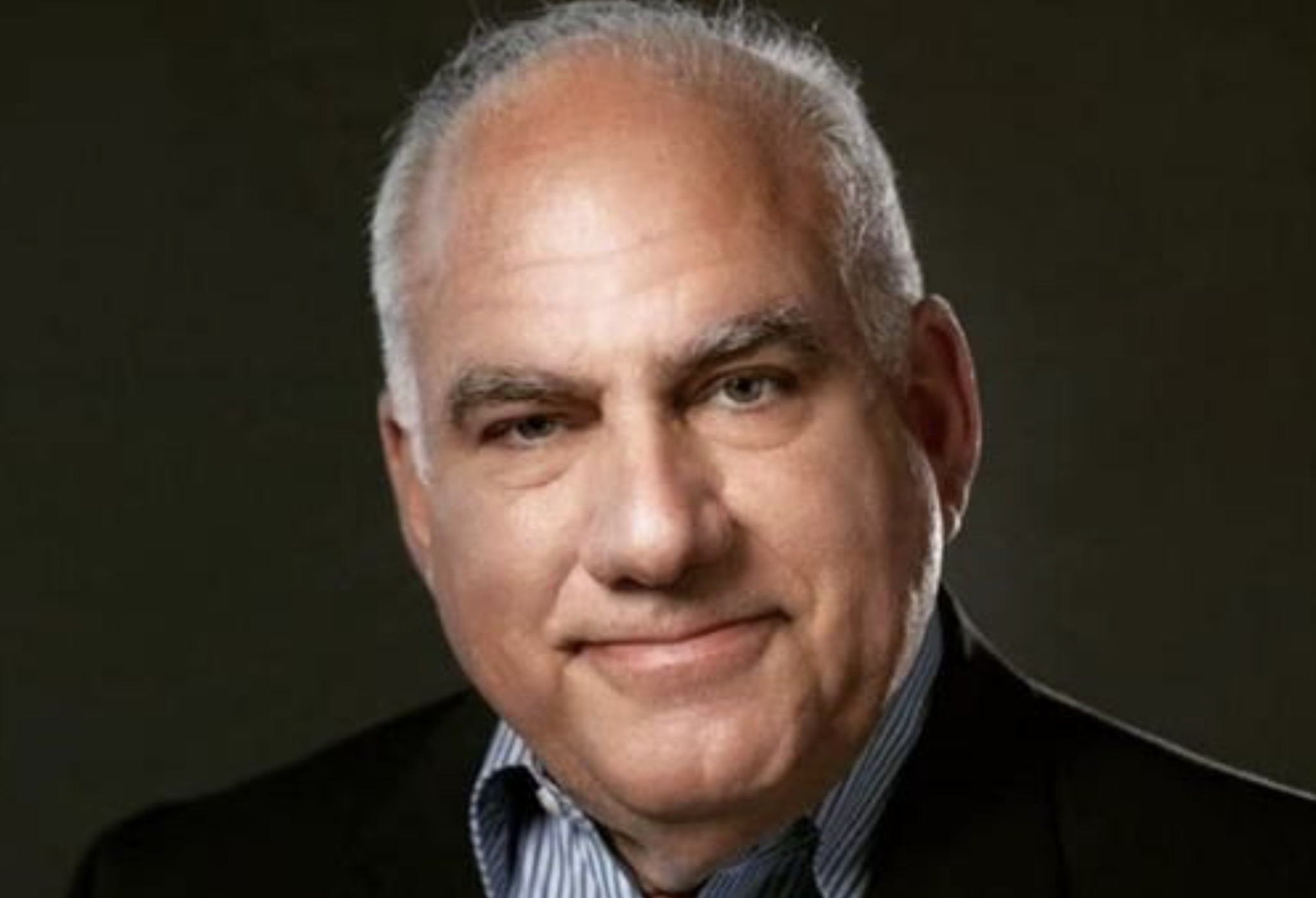
Born in New York City, Philip Michael Quartararo led EMI Records, Virgin Records and Warner Bros. records during his influential career. Quartararo, a longtime Newhouse Advisory Board member, was also a strong supporter of the Bandier Program’s move to the Newhouse School.
“Phil was an outstanding board member, and one I had come to count upon for wise counsel, especially when it came to the music industry, future opportunities for Newhouse in audio, and our growing presence in Southern California,” Dean Mark J. Lodato said.
He recounted last seeing Quartararo in October in California for the celebration of the Kari and Dick Clark Foundation’s Forever Orange Campaign gift to expand the University’s presence in Los Angeles and impact in the entertainment field.
“He was as positive as ever,” Lodato recalled, “and as he always did, pledged his full support to me and the Newhouse School. I often heard this refrain from Phil: ‘Whatever you need, Mark!’”
Quartararo first began booking acts in high school and took a job as a college representative for A&M Records while studying at Newhouse, where he graduated with a bachelor’s degree in television, radio and film. He then moved to Buffalo as the local promotional representative for A&M, where he helped break in artists like The Police and Bryan Adams.
It was the start of 46-year career that included leadership positions with nearly every major record label. Quartararo was named Billboard’s Music Executive of the Year Award in 2001.
Bill Werde, director of the Bandier Program, described Quartararo as a “beloved founding father” who was a trusted advisor to many in the program and Newhouse. “A role he clearly cherished was that of helping the next generation of music industry leaders,” Werde said.
A funeral service was scheduled for Thursday in Santa Monica, California, with a Mass of Celebration being planned in New York City sometime in January. Another celebration of Quartararo’s life is planned for Jan. 29 in Los Angeles, which is the start of Grammy Awards week.
In lieu of flowers, Quartararo’s family has asked for donations to be made in his memory to the Phil Q Memorial Fund at the S.I. Newhouse School of Public Communications at Syracuse University. Donations may be made online at givetosu.syr.edu/philq or sent to Syracuse University, 640 Skytop Road, 2nd Floor, Syracuse, NY 13244. For more information contact Lynn Vanderhoek at Lavander@syr.edu.
Student Spotlight: Lena Osso
Lena Osso was on vacation with her family in the summer of 2023 when a commercial popped up on the television in their room. It looked familiar.
It was an ad for a Royal Caribbean Alaskan Adventure Cruise that the Newhouse School senior produced last year while working as an intern for Option A Group, a video production company near her home in Connecticut. The commercial, as it turns out, was being shown on all Royal Caribbean cruise ships across the globe — including the one the Osso family happened to be sailing on.
“When I got into my room, I heard the music on the screen and I immediately looked over, it was the video that I had produced the summer before,” Osso said. “My whole family was like, ‘Oh my God! Lena’s video is on the TV. She made this!’
“So that was a pretty full circle moment for me where I realized that thousands of people had watched this video that I had made,” Osso said.
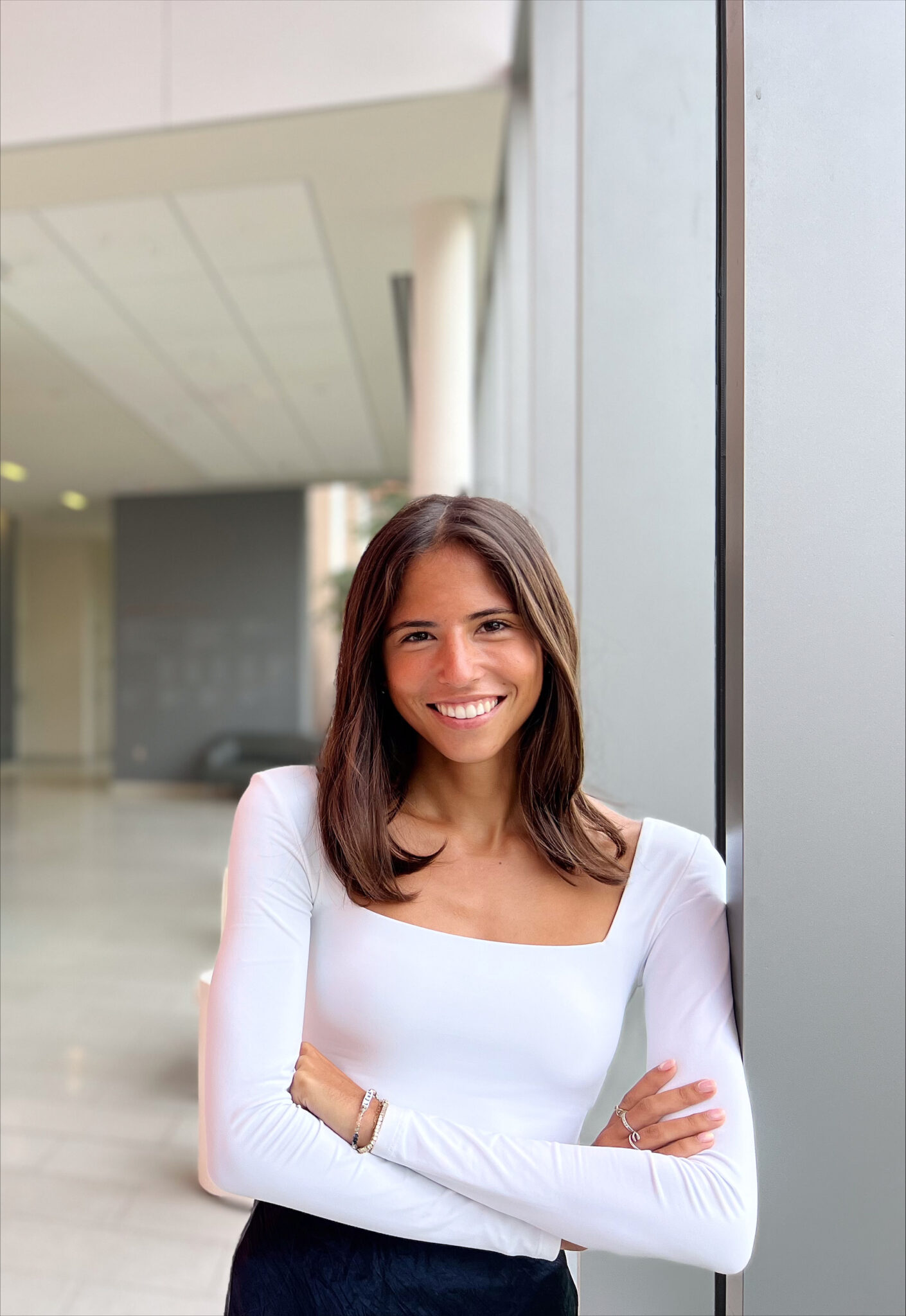
The television, radio and film (TRF) major seems to be right on course to succeed after graduation.
And to think, Osso once pondered in high school whether she wanted to go to college. She was prepared to enter straight into the workforce or move somewhere to chase her dreams of a career in the music industry.
And why not? Osso already had experience. In high school, Osso was the first female director of her school’s daily morning show. She was the editor-in-chief of her school newspaper. She made YouTube videos and video projects for school sports teams, athletes and local businesses. She even started her own freelance videography business when she was 16.
But she also heard about the opportunities at Syracuse University through Newhouse.
“If I’m going to college, I’m going to try and see if I can get into Newhouse,” Osso said. “If I don’t, I’ll figure out another plan.”
No need to figure out an alternative.
“As a little teenager, I was like, ‘Really? You want me to make that?’” Osso recounted. “But I guess I didn’t realize how much video, filming and editing talent I actually had at a very young age. Everyone told me, ‘You have to keep doing this. This is what you’re meant to do.’ So, I took that and ran with it.”
At Newhouse, Osso has participated in student organizations including Zipped Magazine, Jerk Magazine and Citrus TV as an editor. She has worked as a videographer at University Union and is a founding member of music video production company 6Degree, along with five fellow Syracuse students. Osso mostly worked on the creative side in the company, learning what an artist wants from their video, storyboarding, shopping for set designs and location scouting to construct the video sets.
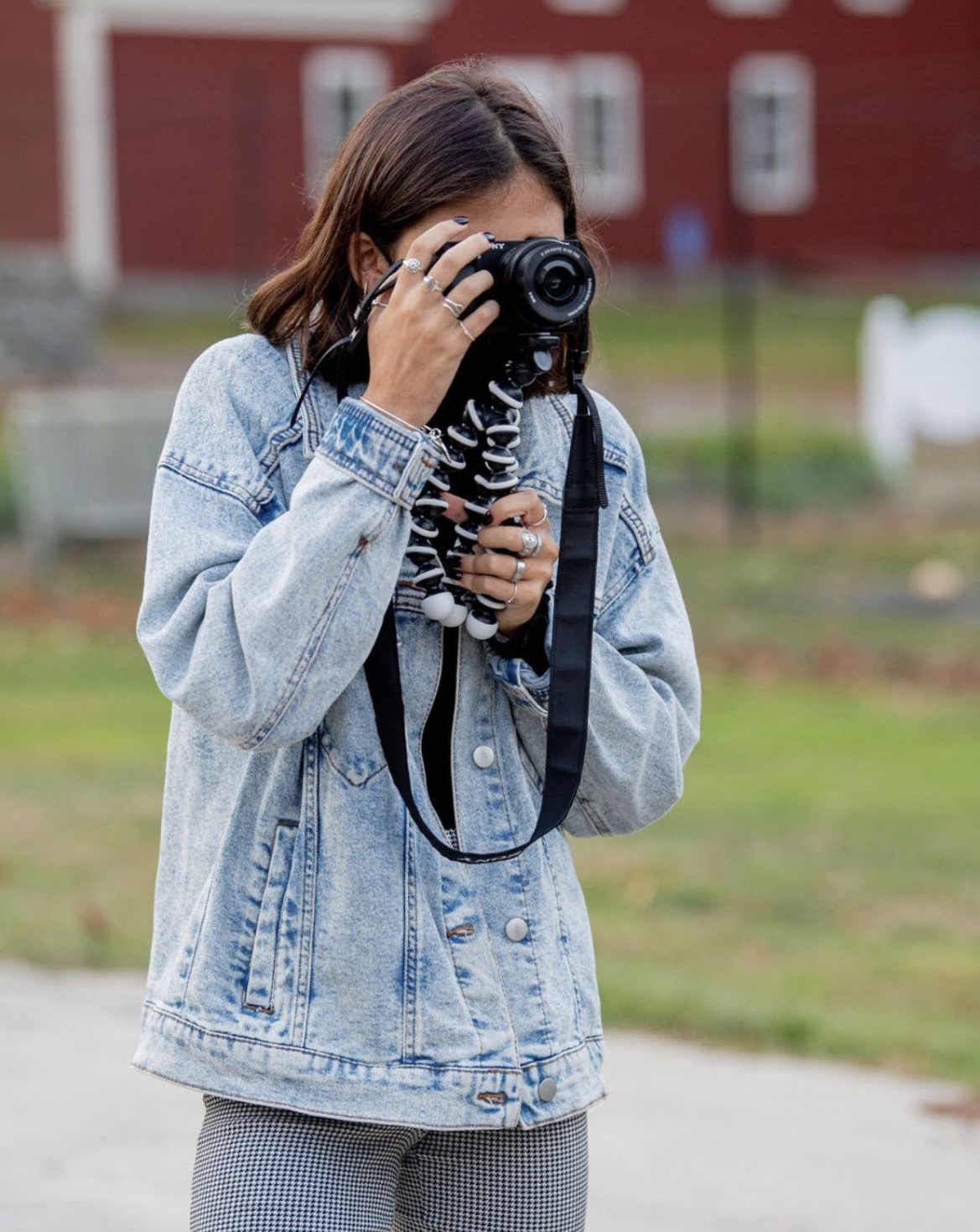
“[6Degree] was a great experience for me to actually learn how to set up meetings with artists and work and talk with them about how to make their songs come to life,” Osso said. “We were able to do it all on our own, which is super cool.”
That initiative had a rousing start, too: their first project, a 30-second promotional video for the artist 33col3, ended up premiering on a billboard in Times Square in October 2022.
“I was like, ‘Of course do it!’” Ben Frahm, a TRF assistant professor, recalled when Osso asked to be excused from a creative production class to watch the Times Square premiere.
“That’s what every professor hopes for, that our students are getting out there,” Frahm said. “They’re furthering their wants, aspirations and networks. Lena does that.”
Almost halfway through her final year at Newhouse, Osso wants to take advantage of as many Newhouse connections as she can to find job opportunities in New York or Los Angeles. Scheduled to graduate in May, Osso also plans to create another startup, or build off the one she established through her entrepreneurship classes.
Osso has plenty of options, thanks to the many opportunities she created for herself.
“I sometimes found it difficult to find an exact organization that I thought I could thrive in, which is why I have so many on my resume,” Osso said. “My biggest piece of advice is that if you can’t find something that you like, make it yourself … so just create whatever you want to and put your name out there.”
Griffin Uribe Brown is a sophomore in the magazine, news and digital journalism program at the Newhouse School.